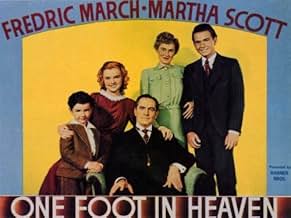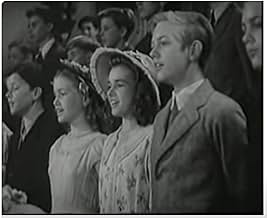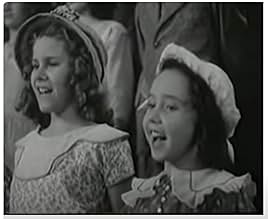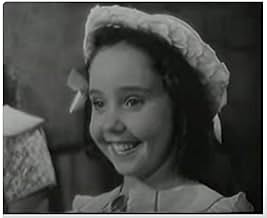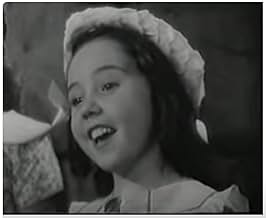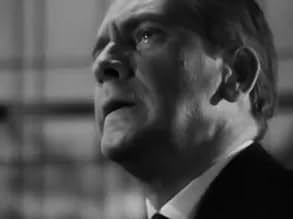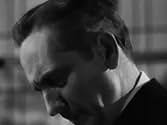AVALIAÇÃO DA IMDb
6,6/10
1,6 mil
SUA AVALIAÇÃO
Adicionar um enredo no seu idiomaEpisodic look at the life of a minister and his family as they move from one parish to another.Episodic look at the life of a minister and his family as they move from one parish to another.Episodic look at the life of a minister and his family as they move from one parish to another.
- Direção
- Roteiristas
- Artistas
- Indicado a 1 Oscar
- 2 vitórias e 1 indicação no total
Dorothy Adams
- Woman Behind Hope at Baptism
- (não creditado)
Joan Anderson
- Child
- (não creditado)
- Direção
- Roteiristas
- Elenco e equipe completos
- Produção, bilheteria e muito mais no IMDbPro
Avaliações em destaque
Of course, it's impossible to tell how much of this story is dramatized and how much is real. And the gothic ideals of what a "church" should be are now very period--as they should be. But what makes this film work is the human nature presented through the characters. I say this because, as a (United) Methodist pastor, I know and have known the very types of characters represented in this film. And as one who sometimes wonders whether I'm fulfilling the mandate of my calling, this film was a welcome and refreshing reminder of maintaining my focus. It is probably a good insight for church members who want to get a glimpse of what life is truly like for a clergy person, then as now (though my parsonage is countless times better than what poor Dr. Spence had to live with!). A recommended dose of reality for the clergy-weary and the clergy-wary alike!
ONE FOOT IN HEAVEN is a wonderful story of what it takes to not only endure the difficulties in being a minister; but how these problems build character.
Year after year of allowing church bosses and bullies to dictate what will and won't be allowed, the minister finally learns how to beat them at their own game.
It has so many touches of warmth, in which a subliminal message of truth is going on coupled with hints of blackmail and leverage.
When Dr. Spence refuses to name his own son Wm. Spence, Jr. because he says, "Junior is a sissy name and I won't have my son being a sissy!" his wife decides to coerce him by holding back on the cooking of dinner until he gives in to her wishes. Thinking she's won, he says he'll name the baby in church next Sunday. As he asks for the name and she announces to the congregation, "William Spence, Junior," he repeats it as "William Frasier Spence" ("named after my grand old Scottish Uncle Frasier--and I don't mean the one who was hanged as a horse thief!")
It is this war of wills that carries the story; making each episode build to the next one. Tempered with touches of right and wrong, it is a classic! A must see! Good conflict, good story line.
Nominated for an Academy Award for Best Picture.
Year after year of allowing church bosses and bullies to dictate what will and won't be allowed, the minister finally learns how to beat them at their own game.
It has so many touches of warmth, in which a subliminal message of truth is going on coupled with hints of blackmail and leverage.
When Dr. Spence refuses to name his own son Wm. Spence, Jr. because he says, "Junior is a sissy name and I won't have my son being a sissy!" his wife decides to coerce him by holding back on the cooking of dinner until he gives in to her wishes. Thinking she's won, he says he'll name the baby in church next Sunday. As he asks for the name and she announces to the congregation, "William Spence, Junior," he repeats it as "William Frasier Spence" ("named after my grand old Scottish Uncle Frasier--and I don't mean the one who was hanged as a horse thief!")
It is this war of wills that carries the story; making each episode build to the next one. Tempered with touches of right and wrong, it is a classic! A must see! Good conflict, good story line.
Nominated for an Academy Award for Best Picture.
Being a preacher's kid is never easy. I was one, and so was my wife. This movie portrays in dramatic ways the humanity and humour of being a preacher's family living essentially on hand outs and never quite having the perfect home for the kids. I can relate to Hartzel, the eldest son. Like him I wished my Dad could have been anything else but a preacher. Like Hartzel I found out in many situations just how much Dad would go through for us.
This movie is nostalgic in many ways. It hearkens back to a time when values like vision, and sacrifice were highly esteemed, and were going the extra mile was not an option but an expected way of life. Sometimes, when I look back, I rewind this video and watch it.
It is a human story, wrapped up in the faith of a man and his family, who laid hold of a dream to make God real in every facet of life, and to show people that God cares about all of us. It is a story of trial and adversity and perseverance and triumph. In the end it is not the glory and accolades of man that matter, but of having lived a life well lived and full to brim.
The cast of this film is perfect and very believable. Some of the characters I have known personally in different churches my father pastored. It is as if they are in every congregation. The issues of never owning a home or being able to decorate as you please, or not having enough groceries, and even the leaky roof over our heads, all resonate. I have lived through them myself. These things really happened to the circuit preachers and those who went and started new churches. These things still happen.
It is a good script, and is not in conflict with the book. The book is well worth the read as well. I have both the movie and the book. It sits amongst my most prized possessions.
You will find yourself laughing, you will shake your head in disbelief, you will get ticked off, but in the end you will find yourself appreciating and loving this very human family that attempts to keep loving and keep living out what they believe, to love God and to love your neighbour as yourself.
This movie will reveal just how much and how full a life can be, and how meaningful it is to serve others. Gayle Sayers the Hall of Fame running back of the Chicago Bears said, "God first, others second, myself third." This is exactly what this movie is about. Getting the priorities right and living life to the full.
This movie is nostalgic in many ways. It hearkens back to a time when values like vision, and sacrifice were highly esteemed, and were going the extra mile was not an option but an expected way of life. Sometimes, when I look back, I rewind this video and watch it.
It is a human story, wrapped up in the faith of a man and his family, who laid hold of a dream to make God real in every facet of life, and to show people that God cares about all of us. It is a story of trial and adversity and perseverance and triumph. In the end it is not the glory and accolades of man that matter, but of having lived a life well lived and full to brim.
The cast of this film is perfect and very believable. Some of the characters I have known personally in different churches my father pastored. It is as if they are in every congregation. The issues of never owning a home or being able to decorate as you please, or not having enough groceries, and even the leaky roof over our heads, all resonate. I have lived through them myself. These things really happened to the circuit preachers and those who went and started new churches. These things still happen.
It is a good script, and is not in conflict with the book. The book is well worth the read as well. I have both the movie and the book. It sits amongst my most prized possessions.
You will find yourself laughing, you will shake your head in disbelief, you will get ticked off, but in the end you will find yourself appreciating and loving this very human family that attempts to keep loving and keep living out what they believe, to love God and to love your neighbour as yourself.
This movie will reveal just how much and how full a life can be, and how meaningful it is to serve others. Gayle Sayers the Hall of Fame running back of the Chicago Bears said, "God first, others second, myself third." This is exactly what this movie is about. Getting the priorities right and living life to the full.
In a class I was taking we were assigned to watch this movie, and then, on paper, keep track of the conflicts that were found. I couldn't stop writing. It was one conflict after another.
I have just been moved to a new church, and though my problems were no where near what the pastor in the movie had to face, I learned a lot from it and I decided to share it with others.
We showed the movie at a Sunday Night service and it was well received and I recommend showing it to your churches. It generated a lot of laughter, especially the differences from then to today, but it also made many good points that hit home. I noticed a change in their attitudes the next day.
I have just been moved to a new church, and though my problems were no where near what the pastor in the movie had to face, I learned a lot from it and I decided to share it with others.
We showed the movie at a Sunday Night service and it was well received and I recommend showing it to your churches. It generated a lot of laughter, especially the differences from then to today, but it also made many good points that hit home. I noticed a change in their attitudes the next day.
One Foot in Heaven is based on the memoirs of journalist Hartzell Spence's growing up as a Methodist preacher's kid in midwest USA from the Theodore Roosevelt era to the Roaring Twenties. It's what they mean when they talk about a family values film. The Camden Family of Seventh Heaven could well have been modeled on the Spence Family of generations past.
Young William Spence played by Fredric March has abandoned a career in medicine after being saved at a revival meeting and goes all the way and becomes a Methodist minister. Though taken aback by the career change, fiancé Martha Scott still marries him and the story follows them for the next 20 years or so, moving from one parish to another. Scott and March are such a good fit as the preacher and wife you would think that March was doing this with his own wife, Florence Eldridge.
March strikes just the right note as the minister, a just and pious man without being overbearing and sanctimonious. Would that preachers today were like him. He also demonstrates a capacity to learn. When his son goes to the silent cinema in defiance of Methodist preaching against the cinema, March takes him in hand to show him the error of his ways. They go to a William S. Hart western and March to his amazement finds he likes it and the western tale carries a good moral positive moral lesson. He changes his own view on the subject.
He also has to deal with a whole lot of modern day pharisees in dealing with the various politics of every parish he's assigned to. Chief among his tormentors are Beulah Bondi, the richest woman in town, who's actually offended by him treating her gardner Harry Davenport as an equal.
And there's Gene Lockhart who has something of the same role here as in Going My Way. But he's not as nice in this film. When he loses control of the church choir which Lockhart regarded as his private preserve, he and wife Laura Hope Crews mount a vicious smear campaign against March's son Frankie Thomas. His confrontation with Hope Crews and her gossip circle is a high point of the film.
Like Seventh Heaven there are some good humorous moments as well. I like March trolling for some marriage business down at the town clerk's office, looking for some wedding fees when times are a little lean. And the usual problems of dealing with parsonages which are not the most kept up buildings in the town.
The title of the film comes from March's explanation that he and his family have to set an example if in fact his profession puts them one foot in heaven already. It's good entertainment and Fredric March and Martha Scott do set the best example we'll ever see.
Young William Spence played by Fredric March has abandoned a career in medicine after being saved at a revival meeting and goes all the way and becomes a Methodist minister. Though taken aback by the career change, fiancé Martha Scott still marries him and the story follows them for the next 20 years or so, moving from one parish to another. Scott and March are such a good fit as the preacher and wife you would think that March was doing this with his own wife, Florence Eldridge.
March strikes just the right note as the minister, a just and pious man without being overbearing and sanctimonious. Would that preachers today were like him. He also demonstrates a capacity to learn. When his son goes to the silent cinema in defiance of Methodist preaching against the cinema, March takes him in hand to show him the error of his ways. They go to a William S. Hart western and March to his amazement finds he likes it and the western tale carries a good moral positive moral lesson. He changes his own view on the subject.
He also has to deal with a whole lot of modern day pharisees in dealing with the various politics of every parish he's assigned to. Chief among his tormentors are Beulah Bondi, the richest woman in town, who's actually offended by him treating her gardner Harry Davenport as an equal.
And there's Gene Lockhart who has something of the same role here as in Going My Way. But he's not as nice in this film. When he loses control of the church choir which Lockhart regarded as his private preserve, he and wife Laura Hope Crews mount a vicious smear campaign against March's son Frankie Thomas. His confrontation with Hope Crews and her gossip circle is a high point of the film.
Like Seventh Heaven there are some good humorous moments as well. I like March trolling for some marriage business down at the town clerk's office, looking for some wedding fees when times are a little lean. And the usual problems of dealing with parsonages which are not the most kept up buildings in the town.
The title of the film comes from March's explanation that he and his family have to set an example if in fact his profession puts them one foot in heaven already. It's good entertainment and Fredric March and Martha Scott do set the best example we'll ever see.
Você sabia?
- CuriosidadesWilliam S. Hart was the guest of honor at the Hollywood premiere of this movie, since his movie The Silent Man (1917) figures prominently in the plot.
- Erros de gravaçãoAt the beginning of the movie, William Spence (Fredric March) announces he has been "called" to the church and will become a pastor in the Methodist Church. His soon-to-be mother-in-law, Mrs. Norris (Nana Bryant)), replies that she would have preferred that he'd joined the Episcopal Church. At that time, in Canada, the dominant church was the Church of England, not the Episcopal Church. That is predominantly a US institution born out of the American Revolution.
- Citações
William Spence: [to his son, Hartzell] A pastor's family are in a special category. We are uh... Well, It's as if we walked a sort of tightrope. Balancing with one foot on earth and one foot already in heaven.
- ConexõesEdited into Happy Times and Jolly Moments (1943)
- Trilhas sonorasThe Children's Prayer
(uncredited)
from "Hansel and Gretel"
Music by Engelbert Humperdinck
Libretto by Adelheid Wette
Sung by the Robert Mitchell Choir
Principais escolhas
Faça login para avaliar e ver a lista de recomendações personalizadas
Detalhes
- Data de lançamento
- País de origem
- Idioma
- Também conhecido como
- Con un pie en el cielo
- Locações de filme
- Empresa de produção
- Consulte mais créditos da empresa na IMDbPro
- Tempo de duração
- 1 h 48 min(108 min)
- Cor
- Proporção
- 1.37 : 1
Contribua para esta página
Sugerir uma alteração ou adicionar conteúdo ausente


